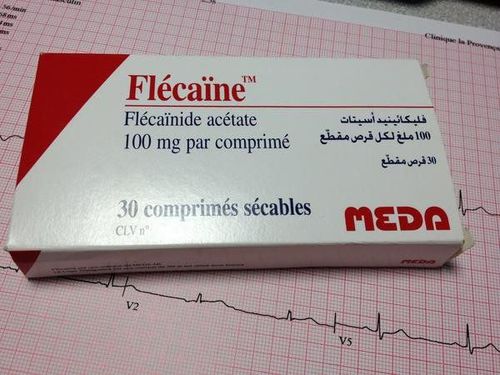This is an automatically translated article.
Flecainide is an antiarrhythmic drug, used to prevent and treat abnormally fast heart rates of dangerous levels. Flecainide works by reducing the entry of sodium into heart cells, which prolongs the action potential of the heart.
1. What is the effect of Flecainide?
Flecainide is a prescription medication used to treat certain severe (possibly fatal) irregular heartbeat conditions, such as persistent ventricular tachycardia and paroxysmal supraventricular tachycardia.
Using Flecainide will help:
Restore a normal heart rhythm; Maintain a regular and stable heart rate; Prevent certain irregular heartbeat conditions from recurring (such as atrial fibrillation). Currently, Flecainide is one of the effective antiarrhythmic drugs, which works by blocking certain electrical signals of the heart (the cause of irregular heartbeat).
Older adults should discuss with their doctor/pharmacist the risks and benefits of Flecainide and how it compares to the effectiveness and safety of other treatments.
2. Instructions for using Flecainide
Take Flecainide with a frequency of 2 times / day or as directed by your doctor, with or without food. The specific dosage of Flecainide for each patient will be determined based on: Age; Health status; Reactions to treatment or other medications they are taking. Using Flecainide regularly and on schedule will help it work its best. Taking your medicine at the same times each day is a way for you to remember and avoid missing doses. Tell your doctor if your heart rhythm does not improve or gets worse despite being treated with Flecainide.
3. Side effects when taking the drug Flecainide
When using Flecainide, some unwanted symptoms may appear, such as:
Dizziness Vision problems (blurred vision, difficulty focusing on one point) Headache Nausea Tremor Fatigue Weakness. Tell your doctor/pharmacist right away if these side effects of Flecainide persist or get worse.
Some serious side effects of Flecainide include:
Shortness of breath; Swollen ankles/feet; Unusual fatigue; Unusual/sudden weight gain. Very serious side effects of Flecainide, which require immediate medical attention, include:
Unusual fast heartbeat; Severe dizziness; Faint ; Very serious (very rare) allergic reaction: Rash, itching/swelling (especially of the face/throat/tongue); Shortness of breath.

Flecainide là một trong những loại thuốc chống loạn nhịp tim hiệu quả
4. Warnings and cautions when using Flecainide
Before taking this medicine, tell your doctor or pharmacist if you are allergic to Flecainide or any other allergic condition. Flecainide may contain inactive ingredients, which could potentially cause an allergic reaction or other medical problem.
Before using Flecainide, tell your doctor or pharmacist your medical history, especially of: Kidney problems; Liver; Heart (eg, history of heart attack, need for a pacemaker).
Flecainide can make you dizzy, which is worse when alcohol or marijuana is used. Therefore, do not drive, operate machinery, or do anything that requires alertness until you can ensure it is safe.
Flecainide may cause QT prolongation that affects heart rate. Rarely, long QT syndrome will cause severe tachycardia/irregularity; and other symptoms (such as severe dizziness, fainting) that require immediate medical attention.
Your risk of QT prolongation may be increased if you:
Have certain medical conditions; Are taking other medicines that can also prolong QT; Have low levels of potassium or magnesium in the blood; Use of certain medications (such as diuretics); Have conditions such as: Excessive sweating, diarrhea or vomiting. Older adults may be more sensitive to the side effects of flecainide, especially QT prolongation.
Pregnant women should only use Flecainide when clearly needed, having weighed the risks and benefits with their doctor.
Although Flecainide passes into breast milk, it is unlikely to harm a nursing infant. However, you should still consult your doctor before breastfeeding.
5. Interactions between Flecainide and other drugs
Drug interactions can change the way Flecainide works or increase your risk of serious side effects. Therefore, you need to create a list of all the medicines and herbs you are taking and share them with your doctor and pharmacist for the best dosage. Without professional approval, do not start/stop or change the dosage of any medication.
Many drugs other than flecainide can affect heart rate (QT prolongation) including dofetilide, procainamide, sotalol and the antibiotic erythromycin...
Other drugs can affect how flecainide is eliminated from the body , thereby affecting the effectiveness of the treatment. Examples include cimetidine, some HIV protease inhibitors, antiepileptic drugs (such as phenobarbital)...
6. Other notes when using Flecainide
6.1. Overdose and missed dose When overdosing Flecainide can cause symptoms such as:
Fainting or difficulty breathing (severe, call 911); Severe nausea/vomiting; Convulsions; The heart beats very slowly; Intense dizziness. Conversely, when you forget to take a dose of Flecainide, you need to take it as soon as you remember. However, the missed dose should be skipped if it is almost time for the next dose. Continue to take Flecainide at the usual time with the same dose.
6.2. Storage Store Flecainide at room temperature, out of light, moisture, and reach of children and pets. Do not store medication in the bathroom, flush it down the toilet, or pour it down the drain. Dispose of the product appropriately when it has expired or is no longer in use.
Finally, do not share Flecainide with other people. You should also have periodic medical tests (such as an EKG) to monitor your progress and check for side effects if they occur.
Please dial HOTLINE for more information or register for an appointment HERE. Download MyVinmec app to make appointments faster and to manage your bookings easily.
Reference source: webmd.com












